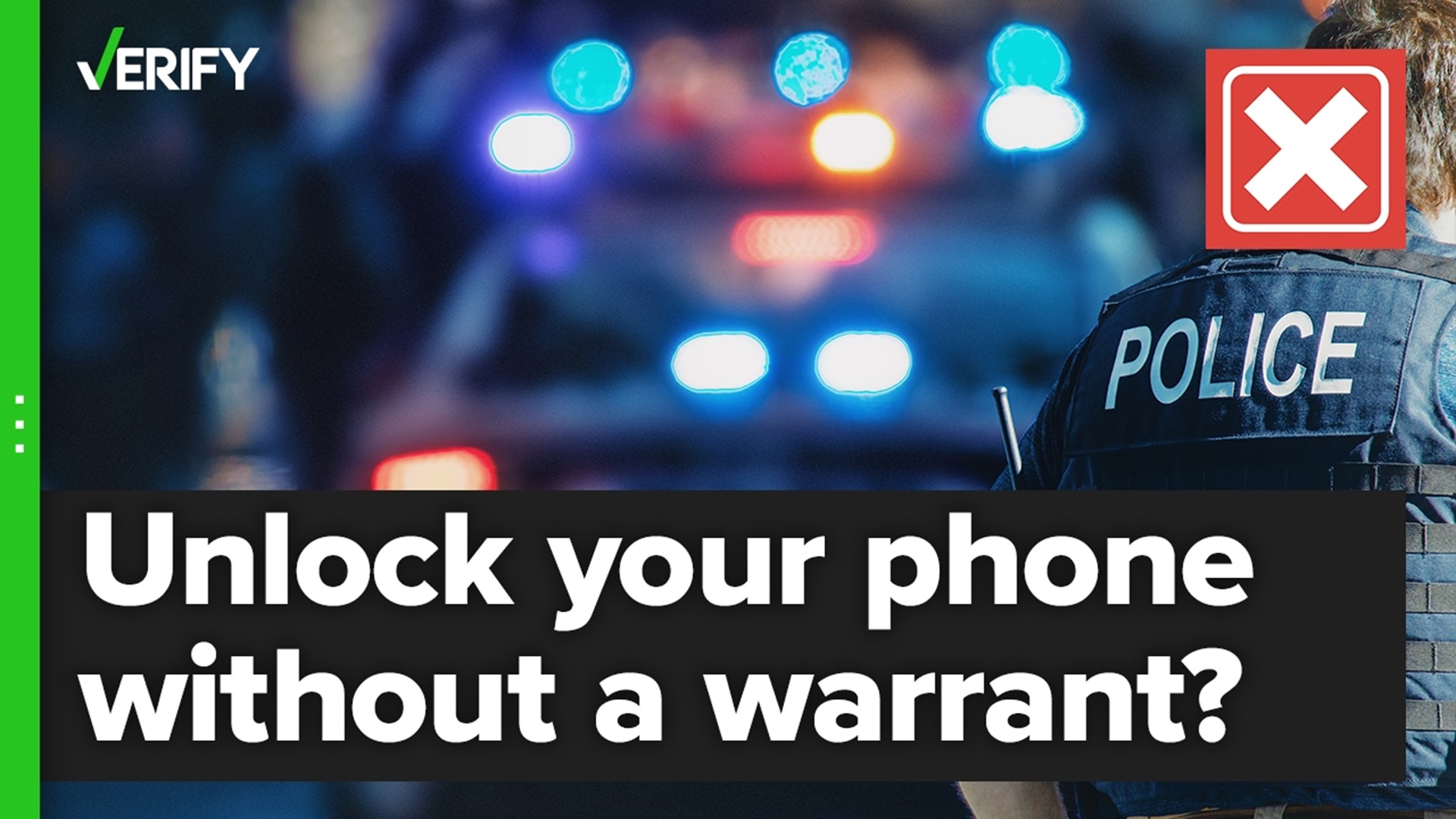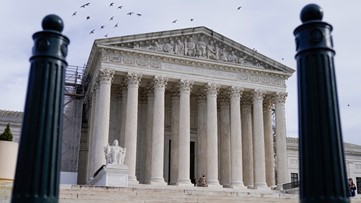People hold more information than ever before with the messages, apps, photos and videos stored on their phones. That often makes cellphones of interest to law enforcement when investigating a case.
One tweet with 20,000 likes warned people to never give their unlocked phone to police, adding that phone passwords are protected by the Constitution. This warning contradicts another, older viral tweet that claimed the police can “look through your phone without a warrant” while you’re arrested.
THE QUESTION
Can the police require you to unlock your phone without a search warrant?
THE SOURCES
- Fourth and Fifth Amendments of the U.S. Constitution
- Lawyers and law offices based in Rhode Island, Arizona, North Carolina and Colorado
- Maricopa County, Arizona Public Defense Services
- Congressional Research Service (CRS)
- Andrews v. State of New Jersey
- Riley v. California
THE ANSWER
No, the police can’t require you to unlock your phone without a search warrant. But even when police have a warrant, some courts have ruled that your cellphone password is protected by the Fifth Amendment and you cannot be compelled to share it.
WHAT WE FOUND
The Fourth Amendment of the U.S. Constitution protects Americans from “unreasonable searches and seizures” — meaning law enforcement must have a warrant or your consent to search your possessions with a few exceptions.
The Law Office of Thomas C. Thomasian, a Rhode Island law firm, says this protection extends to your phone, meaning the police cannot search your phone without a warrant or your permission.
A search warrant is a document issued by a judge or magistrate that authorizes a police officer to search a specified place for evidence, even if the person who owns the item or place does not consent to it. To obtain a warrant, law enforcement must show there is probable cause a crime may have been committed or evidence that a crime exists in the place being searched. The warrant describes exactly where and what law enforcement is allowed to search and seize.
But if an officer doesn’t have a search warrant, you can turn down their request.
“If an officer asks you to unlock your phone or to search your phone, you have the right to decline,” says the public defense services department of Maricopa County, where Phoenix, Arizona is located. “The officer, however, may be able to take the cellphone as evidence.”
Law office blogs based in Colorado and North Carolina explain that a police officer can seize your phone if you’re arrested and hold it while they wait for a search warrant. While they’re allowed to remove the phone’s battery or case, they cannot search the contents of the phone until they have a search warrant. Todd Coolidge, a lawyer at Coolidge Law Firm in Arizona, says you don’t have to share your phone’s passcode with the police if they take it as evidence.
There are only a few limited exceptions to the requirement that law enforcement get a warrant or permission to search your phone. If the police reasonably believe evidence on your phone may be destroyed before they can get a warrant, they may search it without your permission. They may also search your phone without a warrant or permission if there is a time-sensitive emergency — in Riley v. California, the Supreme Court case that established the warrant requirement for phone searches, the Supreme Court used hypothetical situations where a bomb may soon detonate or a child abduction as examples of such emergencies.
Outside of those exceptions, law enforcement must get a warrant to legally search your phone if you do not give them permission. Even if the police do obtain a warrant to search your phone, they may not be able to force you to unlock your phone depending on where you live.
A Congressional Research Service (CRS) report from 2020 said, “Courts have reached conflicting conclusions as to whether and when the compelled decryption of a password- or biometric-identifier-protected device runs afoul of the Fifth Amendment.” The Fifth Amendment of the U.S. Constitution says no American can be “compelled in any criminal case to be a witness against himself.”
The CRS report found that most courts that have ruled on the issue view cellphone passcodes as “testimonial,” and therefore under the protection of the Fifth Amendment. It also found a few courts believe this extends to phones that unlock using biometrics, like a fingerprint or facial ID. However, this is not universal across every American court, and some courts say law enforcement can force you to unlock your phone if they have a warrant to search it.
In 2021, the Supreme Court had the opportunity to rule on the issue when Andrews v. State of New Jersey was appealed to the nation’s highest court, but declined to take the case. As a result, there’s no federal precedent for passcode protections.
Even if you don’t provide law enforcement with the passcode to unlock your phone, they still have a few avenues for accessing some of the data on your device. The police may submit a request or demand to a phone carrier or manufacturer for a person’s data.
Apple says it complies with “legally valid” requests, but requests the company determines “to have no valid legal basis or considers to be unclear, inappropriate or over-broad are objected, challenged or rejected.” Apple can provide law enforcement with data stored on its servers, but only has access to the data stored on some of their phones. According to Apple, it cannot extract data from a passcode-protected phone running iOS 8.0 or later versions, which covers all devices since iPhone 6. That’s because the data on those phones is encrypted and Apple does not have the key to unlock the encryption.
AT&T says stored content, like text messages and voice messages, “generally” require a warrant for AT&T to share the data with law enforcement. AT&T may choose to reject, challenge or only partially comply with a legal demand if the demand has errors or is not the applicable to the sought-after data.
Another way law enforcement may be able to bypass your passcode to search your phone is through data extraction technology, according to Upturn, a nonprofit focused on technology, equity, and justice.
The Electronic Frontier Foundation (EFF), a digital civil liberty nonprofit organization, says you should demand to see the warrant if law enforcement claims to have one to search your phone. EFF says you should not interfere with their search if the police attempt to search your phone without a warrant or your permission. Instead you should “write down the names and badge numbers of the officers and immediately call a lawyer.”
More from VERIFY: Yes, overdraft fees cost Americans more than burglaries












